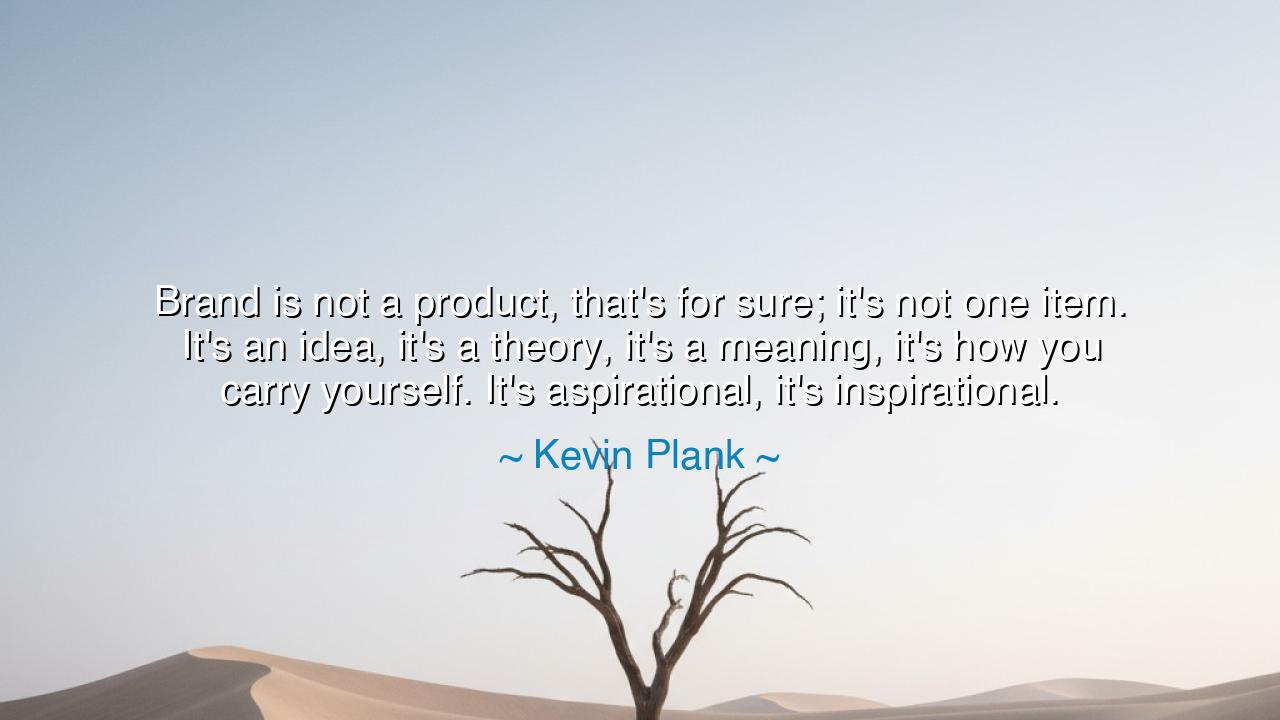
Brand is not a product, that's for sure; it's not one item. It's
Brand is not a product, that's for sure; it's not one item. It's an idea, it's a theory, it's a meaning, it's how you carry yourself. It's aspirational, it's inspirational.






In the vast domain of human endeavors, there exists a power far greater than the tangible, the physical, or the material—this is the power of identity, of ideas, and of meaning. Kevin Plank, a visionary in the world of business, captures this timeless truth when he says, "Brand is not a product, that's for sure; it's not one item. It's an idea, it's a theory, it's a meaning, it's how you carry yourself. It's aspirational, it's inspirational." These words speak to the very heart of what it means to create something that resonates deeply with others—not just a product, but an idea that people can believe in, a vision that inspires them to aspire to something greater.
In the ancient world, great leaders and thinkers were not those who simply provided a service or a product, but those who offered a vision, a philosophy, a way of life that others could follow. Consider the example of Alexander the Great, whose empire stretched across vast lands, not merely because of his military conquests, but because he offered his people a vision of unity, of strength, and of greatness. Alexander was not simply a king; he was a symbol, a living embodiment of the vision he carried—his brand—and through his influence, he inspired generations to dream bigger, to think beyond their current limitations. Plank’s understanding of brand mirrors this truth: it is not the product alone that defines success, but the vision behind it, the meaning it conveys to those who embrace it.
In ancient cultures, a person's identity was often tied to the symbols they carried. Consider the mighty Romans, who wore their toga as a symbol of both their civic duty and social status. The toga was not merely a piece of clothing—it was an outward sign of the ideals they stood for. Similarly, the great philosophers like Socrates and Plato did not merely communicate through words; their teachings and lifestyles embodied a philosophy, an idea that transcended individual teachings. The brand of their thinking, the meaning they imparted, was not in the specific words they spoke, but in the philosophical vision they represented. This vision was aspirational, a guide for others to follow, and it was inspirational, sparking deep reflection and action in those who heard it.
The power of brand—in the ancient sense—is not just in a symbol or item, but in the idea that symbol represents. In the same way, Kevin Plank’s words remind us that a brand is not just a product; it is the embodiment of a philosophy, a lifestyle, and a vision that inspires those who engage with it. Nike is not just known for shoes and apparel; it is a symbol of perseverance, of breaking through limits, of pushing oneself further. Apple is not merely a technology company; it is a vision of innovation, of creativity, and of thinking differently. The true power of a brand lies not in the product itself, but in the story it tells, in the idea it conveys, and in the aspiration it evokes in others.
In the same vein, the most inspirational figures in history were those whose ideas inspired people to act, to change, to dream. Mahatma Gandhi, for instance, did not simply fight for India's independence through political means; he created a movement, a vision of nonviolent resistance that was so compelling it inspired millions to stand up for justice without raising a fist. Gandhi's brand was not in the weapons he used, but in the idea he represented—a peaceful fight for freedom that transcended the physical realm and resonated deeply in the hearts of millions. Gandhi’s example shows us that a true brand is not just a logo, nor just an item, but a living idea that inspires action and shapes the world.
The lesson here is clear: to build something truly powerful, we must focus not on the product we create, but on the vision it carries and the meaning it imparts. A successful brand is one that resonates with others, that stirs something deep within them—a desire to be part of a greater story, a shared mission. Whether we are building a business, a community, or a personal legacy, it is the meaning we attach to our actions, and the values we embody, that will define our success and our influence. Like Alexander, like Gandhi, and like the great thinkers of old, our true impact is not in the things we accumulate, but in the ideas we inspire others to live by.
To future generations, take this wisdom to heart: build not just for today, but for the world you wish to inspire. Craft your life, your work, and your creations with a clear vision of what you want to stand for. Let your ideas, your values, and your aspirations guide you toward creating something far greater than a mere product—create something that inspires, that carries with it a vision for the future. Just as great leaders and visionaries have done throughout history, shape your world with purpose, and your influence will live on long after the products and objects have faded.






AAdministratorAdministrator
Welcome, honored guests. Please leave a comment, we will respond soon